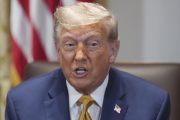Kentucky Senator and potential Republican presidential candidate Rand Paul continued his criticism of Hillary Clinton over the attack in Benghazi in a Friday night speech in Iowa, the state where the voting for presidential nominees begins every four years.
Speaking at the Iowa GOP Lincoln Day fundraising dinner in Cedar Rapids, Paul took aim at the former secretary of state, repeating his charges about her failure to respond to requests for additional security in the months leading up to the armed attack on the U.S. diplomatic mission in Benghazi that killed U.S. Ambassador Christopher Stevens and three other Americans.
“It was inexcusable, it was a dereliction of duty, and it should preclude her from holding higher office,” Paul said, bringing the cheering crowd of about 500 to their feet.
Clinton, a former First Lady and senator from New York, was the runner up to Barack Obama in the 2008 battle for the Democratic presidential nomination. She resigned as secretary of state in January after serving in that office during Obama’s first term as president. Though she is considered the likely frontrunner for her party’s nomination in 2016, her political future may be clouded by recent revelations about unheeded and rejected requests for added security in Libya, and by the State Department’s role in revising “talking points” about the incident to exclude references to terrorist groups and CIA warnings about terrorist activity in Benghazi.
“Where the hell were the Marines?” Paul asked, concerning security failures at the mission. Testifying before the Senate Foreign Relations Committee before leaving office in January, Clinton said she had not personally seen the cables from Libya requesting more security. Paul, a committee member, told Clinton at that hearing he would have fired her. “Had I been president at the time and I had found that you had not read the cables from Benghazi, you had not read the cables from Ambassador Stevens,” Paul said, “I would have relieved you of your post.”
Prior to his Friday night speech, Paul told reporters Clinton’s failure to read the cables is a sign of mismanagement.
“Part of being in charge is triaging what comes to your desk and what doesn’t come to your desk,” he said. “And to say that Libya wasn’t important enough for her to be reading the cables from the ambassador asking for more security, I think was inexcusable.”
Paul, who has said he is actively exploring the possibility of running for president in 2016, began his keynote address with examples of government waste, including what he described as a $325,000 study to determine if a rattlesnake will bite a rabbit that is not wagging its tail. He drew laughter from the partisan crowd by detailing some of the bureaucratic classifications in the Affordable Care Act, commonly referred to as ObamaCare. There are new diagnostic codes for injuries from animals, he said, including nine new codes for injuries from the macaw and two from injuries from a turtle. “Your physician needs to tell the government whether you were struck by a turtle or bitten by a turtle,” he said.
Paul, an ophthalmologist, said, “I’ve asked physicians all over the country, ‘Have you ever seen an injury from a macaw?’ Your government’s just trying to take care of you.”
The Kentucky Republican also took shots at the spending priorities of the Obama administration, noting the suspension of White House tours after budgetary sequestration took effect in January. Paul contrasted that with the millions of U.S. dollars sent to assist the government of Egypt.
“In addition to the $2 billion we are already sending to Egypt, in addition to the F-16s, in addition to the Abrams tanks,” he said. Referring to Obama, Paul asked, “He’s got all that money but he can’t keep the White House open?”
Describing a need for Republicans to draw more racial and ethnic minorities to the party, Paul did not endorse the immigration reform bill backed by Obama and the Senate’s bipartisan “Gang of Eight” that would offer legalization and provide a path to citizenship for the estimated 11 to 12 million residents here illegally. But he did suggest he was open to it. Acknowledging the opposition to the bill from Sen. Charles Grassley and Rep. Stephen King, both Iowa Republicans, Paul said, “I respect Senator Grassley and Congressman King. We may not be on the same page, but we may be.”
Republicans need to treat immigrants “with dignity and respect” and make sure they have jobs if they want to work, he said.
Paul’s visit to the Hawkeye State, coming a mere six months since the last presidential election, has nonetheless encouraged speculation about a possible presidential bid. Iowa’s caucuses typically begin the voting and delegate selection in the contests for each party’s presidential nomination, followed a week later by the New Hampshire primary. Paul will be the keynote speaker at a dinner in New Hampshire on May 20 and will be speaking in South Carolina, another early primary state, in June. He told reporters Friday he does not plan to decide until next year on whether to seek the party’s presidential nomination or reelection to the Senate.
“In all likelihood, I will be on the ballot for the U.S. Senate in Kentucky, though, and we haven’t really looked beyond that,” he said. Speaking in Iowa is “also how you have a bigger voice nationally,” he said. “It’s sort of a place where political leaders come in order to try to talk about issues that they want to resonate nationally.”
Aside from Benghazi, though, it’s not clear what issues Paul wants to have resonate. At times it seems the “strategic ambiguity” he has endorsed for the nation’s foreign policy may be his theme for domestic policies as well. While his father, former Texas Congressman Ron Paul, was clear about favoring the repeal of federal drug laws during his two campaigns for president, Sen. Paul is less so.
“I haven’t come out in favor of legalizing drugs,” he told reporters in Iowa. “But I have come out in favor of saying, you know what, I’m not for putting kids in jail and locking them up and throwing away the key.” Though he will likely inherit a good deal of the support his father drew from young and independent voters when the elder Paul finished third in the Iowa caucuses and second in the New Hampshire primary, he urged reporters not to dwell on comparisons between him and his father.
“After a while, if it isn’t about what I stand for, and if it’s always about a comparison, that means I’m not doing a very good job and am not going to be a significant player on the national scene.”
Photo of Sen. Rand Paul at Iowa GOP Lincoln Dinner event: AP Images




